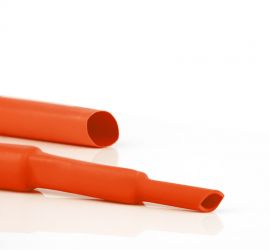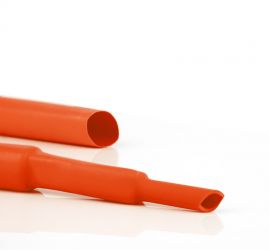Busbar insulation tubing – What is it, and for which applications is it used?

Posted on 17 August 2022
A lesser known type of heat shrink tubing, is busbar insulation tubing. Due to its red colour, it immediately stand out in every heat shrink tubing assortment. But which types of busbar insulation tubing are there? And what sets them apart from other types of heat shrink tubing? Read it in this blog.
The different types of busbar insulation tubing
There are two types of busbar insulation tubing: medium-wall (HBTM) and heavy-wall (HBTH). The properties of these two types are mostly the same. The most important difference is, like the name indicates, the wall thickness. Medium-wall busbar insulation tubing has a wall thickness after shrinking ranging from 2,5 to 2,9 millimetres. Heavy-wall busbar insulation tubing has a wall thickness after shrinking of 4 or 4,1 millimetres.
Properties of busbar insulation tubing
Busbar insulation tubing has a shrink ratio of 2,5:1, is red coloured and is both self-extinguishing and flame retardant. The operating temperature ranges from -40 up to 120 degrees Celsius, with the full shrinking temperature being 110 degrees Celsius. The heat shrink tubing is UV-resistant, halogen free and meets the RoHS requirements. Busbar insulation tubing is made of modified polyolefin.
The most important property of this type of heat shrink tubing are the excellent electrical properties, including creep current resistance.
For what purposes is busbar insulation tubing used?
This type of heat shrink tubing is often used in electrical engineering, due to its most important property: creep current resistance. ‘Busbar’ is not in the name for no reason: a busbar is a thick copper strip which conducts electricity in, for example, a switchboard. Busbar insulation tubing is perfect for protecting such a busbar. The flame retardant and self-extinguishing properties help protection the switchboard or installation against a fire hazard, in addition to the mechanical protection heat shrink tubing offers.
Would you like to know if busbar insulation tubing can be of added value for you? Contact one of our advisors.











